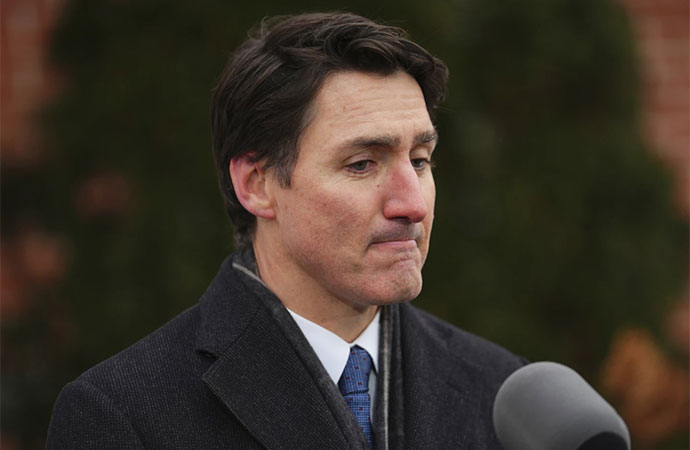World this week

Canadian Prime Minister Justin Trudea. Photo: AP/ UNB
Canadian Prime Minister Justin Trudeau announced his resignation after nearly a decade in power, bowing to rising discontent over his leadership and growing turmoil within his government signaled by the abrupt departure of his finance minister. Trudeau, the latest incumbent to be driven out by rising voter dissatisfaction worldwide, said it became clear to him that he cannot "be the leader during the next elections due to internal battles." He planned to stay on as prime minister until a new leader of the Liberal Party is chosen.
"I do this job because the interests of Canadians and the well being of democracy are something that I hold dear," said Trudeau, who was initially teary-eyed at the announcement outside his official residence. Trudeau came to power in 2015 and was initially hailed for returning the country to its liberal past. But he became deeply unpopular in recent years over a range of issues, including the soaring price of food and surging immigration.
A strong earthquake shook a high-altitude region of western China and areas of Nepal on Tuesday (Jan. 7), damaging hundreds of houses, littering streets with rubble and killing at least 126 people in Tibet, an autonomous region of China. Many others were trapped as dozens of aftershocks shook the remote region. Rescue workers climbed mounds of broken bricks, some using ladders in heavily damaged villages, as they searched for survivors. Videos posted by China's Ministry of Emergency Management showed two people being carried on stretchers by workers treading over the debris from collapsed homes.
At least 188 people were injured in Tibet on the Chinese side of the border, the official Xinhua News Agency said. More than 1,000 homes were damaged in the barren and sparsely populated region, state broadcaster CCTV reported. In a video posted by the broadcaster, building debris littered streets and crushed cars. People in northeastern Nepal strongly felt the earthquake, but there were no initial reports of injuries or damage.
Oil prices fell more than 1% on Wednesday as a stronger dollar and large builds in US fuel inventories last week pressured prices, reversing earlier gains driven by tightening supplies from Russia and other OPEC members. No country weighed down by the significant increases in gasoline and diesel inventories that we've seen over the last couple of weeks. Gasoline stocks rose by 6.3 million barrels last week to 237.7 million barrels, compared with analysts' expectations in a Reuters poll for a 1.5 million-barrel build.
Meanwhile distillate stockpiles rose by 6.1 million barrels, versus expectations for a 600,000-barrel rise. A stronger dollar also pressured prices by making oil more expensive for holders of other currencies. Limiting the losses, oil output from the Organization of the Petroleum Exporting Countries fell in December after two months of increases as field maintenance in the United Arab Emirates offset a Nigerian output hike and gains elsewhere in the group.
The climate crisis is "wreaking havoc" on the planet's water cycle, with ferocious floods and crippling droughts affecting billions of people, a report has found. Water is people's most vital natural resource but global heating is changing the way water moves around the Earth. The analysis of water disasters in 2024, which was the hottest year on record, found they had killed at least 8,700 people, driven 40 million from their homes and caused economic damage of more than $550bn (£445bn).
Rising temperatures, caused by continued burning of fossil fuels, disrupt the water cycle in multiple ways. Warmer air can hold more water vapour, leading to more intense downpours. Warmer seas provide more energy to hurricanes and typhoons, supercharging their destructive power. Global heating can also increase drought by causing more evaporation from soil, as well as shifting rainfall patterns. Deadly flash floods hit Nepal and Brazil in 2024, while river flooding caused devastation in central Europe, China and Bangladesh.

























Leave a Comment
Recent Posts
Auspicious beginnings, but a l ...
The newly elected government of Bangladesh is now in office, and the e ...
Caught between tigers and pira ...
Over 10,000 fishermen in the Sundarbans have suspended their fishing a ...
Historic Chawk Bazar comes alive with iftar items on ..
Shaping Young Conservationists: School Conservation ..
Iran has said it has reached an understanding with t ..
New Finance Minister Amir Khosru Mahmud Chowdhury